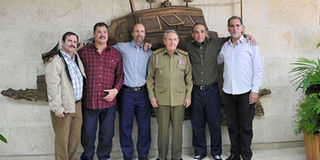Cuban parliament rubber-stamps normalization with US

This picture released by Estudios Revolucion shows Cuban President Raul Castro (3rd-R) receiving released Cuban prisoners Ramon Labanino (2nd-L), Gerardo Hernandez (3rd-L), and Antonio Guerrero (2nd-R), who were greeted also by Fernando Gonzalez (L) and Rene Gonzalez (R) upon their return from the US on December 17, 2014 in Havana. Cuba's parliament on Friday unanimously ratified a deal reached between Havana and Washington normalizing relations after a half-century of hostility. AFP PHOTO
What you need to know:
- Castro is chairing the twice-yearly meeting of parliament in a session largely focused on the communist island's historic renewal of ties with the United States.
- The session was also attended by the "Cuban Five," the group of intelligence agents jailed in the United States whose last three members were released in a prisoner exchange that paved the way for Wednesday's landmark rapprochement.
- Economy Minister Marino Murillo told lawmakers that Cuba would use 30 percent of its export revenues to pay off $5.7 billion in foreign debt next year — meaning the island will need new loans to maintain its cash flow.
HAVANA
Cuba's parliament on Friday unanimously ratified a deal reached between Havana and Washington normalizing relations after a half-century of hostility.
"The Cuban parliament today gave its unanimous support" to the bilateral thaw, which was outlined Wednesday in a speech by President Raul Castro, the Cuban news agency Prensa Latina said shortly after the start of the session.
Castro is chairing the twice-yearly meeting of parliament in a session largely focused on the communist island's historic renewal of ties with the United States.
He had been due to give a closing address in the evening, but the session was extended to Saturday to finish discussions on the Cuban economy, the originally scheduled topic, reported state news agency AIN.
The session was also attended by the "Cuban Five," the group of intelligence agents jailed in the United States whose last three members were released in a prisoner exchange that paved the way for Wednesday's landmark rapprochement.
The men are hailed as national heroes in Havana, which says they were not spying on Washington but rather on Cuban exile groups determined to attack the island.
"This ordinary session has the historic singularity of being held with the five anti-terrorist heroes back in the motherland and the announcement that Cuba and the United States have reestablished diplomatic relations," said AIN as the session opened early Friday.
Cuba's 612-member National Assembly has no opposition representatives and meets twice a year.
The current meeting, which is closed to foreign media, is due to review progress on the annual economic plan, which fell short of its 2.2 percent growth target this year, and approve a new plan for next year.
Economy Minister Marino Murillo told lawmakers that Cuba would use 30 percent of its export revenues to pay off $5.7 billion in foreign debt next year — meaning the island will need new loans to maintain its cash flow.
Despite Castro's tentative steps toward reform since taking over from his older brother Fidel in 2006, the Cuban economy will achieve just 1.3 percent growth for 2014, the council of ministers said earlier this month.





